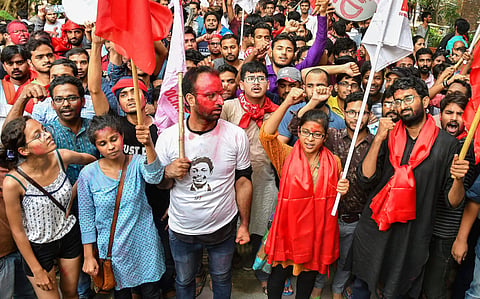

CHENNAI: Even as Congress' Kanhaiya Kumar and Gujarat MLA Jignesh Mevani are taking on the BJP and its Hindutva politics, and carving out a space for themselves in national politics, southern States seem to be lagging behind in producing such young political leaders with the potential to contribute to the national narrative.
Various academicians and activists blamed the "pathetic" condition of student politics in universities in the South for this.
Sai Balaji, a native of Hyderabad who went on to become the JNU Students Union (JNUSU) president in 2018-19 and the national president of the All India Students Association (AISA), complained of a lack of quality public education in State universities in the South.
"We don't have universities like the Delhi University or the JNU in the South. Also, there is no democratic culture in State universities of Tamil Nadu, Karnataka, Andhra Pradesh, and Telangana. If there is no culture of elections, protests, debates, and independent thinking, how will leaders emerge from such spaces?" AISA is the students wing of Communist Party of India (Marxist-Leninist) Liberation.
Radhika Ganesh, founder-convenor of Young People For Politics, alleged successive governments in Tamil Nadu played an active role in curbing student politics. "The State criminalised and stigmatised student politics," she said.
"The youth must understand that the regional political system gains much by keeping young individuals focussed on the State. There is a great need to look beyond Tamil nationalistic understanding and linguistic limitations," she added.
According to G Haragopal, former professor of Hyderabad Central University, it is difficult for young leaders with national aspirations to emerge from regions having political parties professing a strong regional identity. "Those transcending regional identities, former IPS officer RS Praveen Kumar, for example, are getting absorbed by Dalit politics," he said.
Madras Institute of Development Studies professor M Vijayabaskar, however, opined that Southern States do have many promising young leaders, but they are yet to get enough attention. Ajay Gudavarthy, associate professor at the Centre for Political Studies at JNU, said getting into national politics from the South has always been a challenge.
"We have young leaders in the South but they do not get into national politics because of the language barrier," he said, urging young politicians to develop a national vision and learn Hindi to make their presence felt across the country. "This is the right time," he said.
Stating that even regional political parties must introspect on this, Gudavarthy said, "Only Tamil Nadu and Kerala have ideological debates with the BJP-led Union government. As for Telangana and Andhra Pradesh, they have a transactional relationship (seeking benefits and fund allocations) with the Centre."